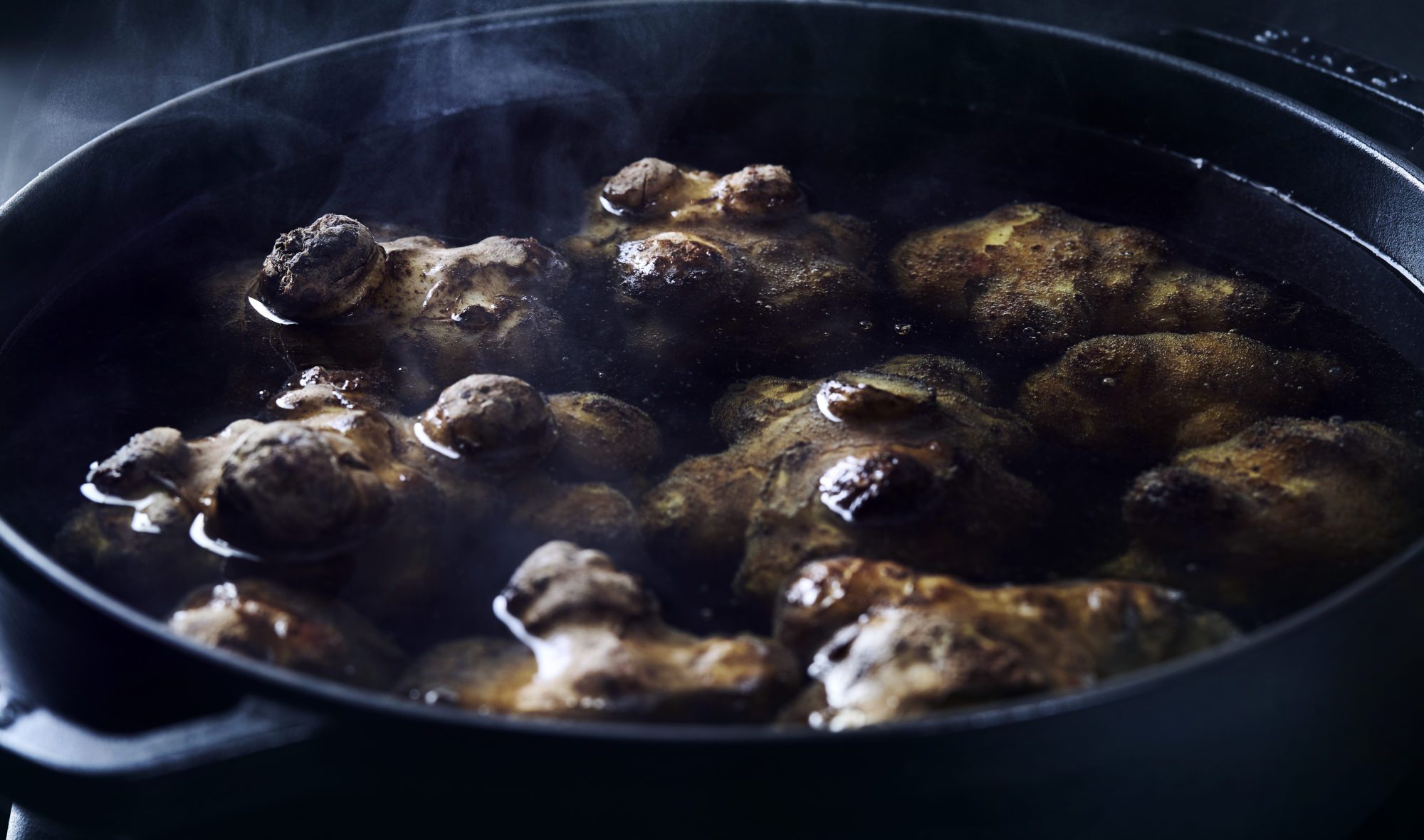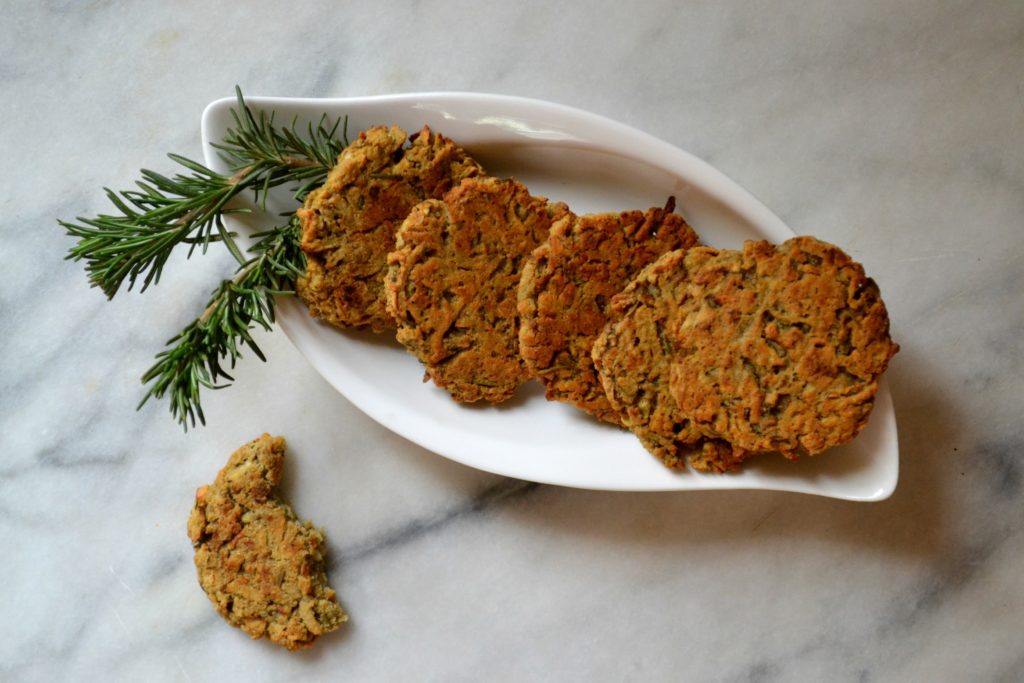Jerusalem Artichoke


The Jerusalem artichoke, also known as sunchoke or earth apple, is a type of knobby root vegetable. Beige with bulbous protuberances, Jerusalem artichokes look like a cross between fresh ginger root and a potato. In flavor, they are rich and nutty, with a satisfying sweetness. This sweetness largely comes from a soluble fiber called inulin that the Jerusalem artichoke contains in abundance. In addition to being very high in this blood sugar balancing, gut-health promoting fiber, Jerusalem artichokes are also an excellent source of potassium and a good source of iron.
Dig beneath the radiating yellow petals of the towering Helianthus tuberosus flower, and you will find the knobby, edible root known as Jerusalem artichoke.
This name is rather confusing, as Jerusalem artichokes are neither from Jerusalem nor are they related to artichokes. Jerusalem artichokes, also known as sunchokes or earth apples, are native to North America and are part of the Asteraceae family, which also includes sunflowers and daisies. Rumor has it that the name “Jerusalem artichoke” was adapted from the Italian word for sunflower, which is girasole. Through multiple antiquated versions of the telephone game, girasole, turned into “Jerusalem”.
Like many members of the Asteraceae family, Jerusalem artichokes are garden thugs. Left unmanaged, they grow prolifically and weedily, choking out more polite species of plants. In fact, Jerusalem artichokes are considered to be a bit of a nuisance by many farmers.
So help a farmer, and destroy a sunchoke (by eating it).
The Jerusalem artichoke is a knobby rhizome that looks like a cross between a small russet potato, a grenade, and a ginger root. It has rough beige skin and is oddly shaped, often having random bulbous protuberances on its otherwise potato-like body. The flesh inside is cream-colored and when raw, is crispy like a radish.
Jerusalem artichokes are typically consumed cooked. In this form, they have a smooth texture and a flavor that is sweet and slightly nutty, with a hint of earth, much like a sweeter, smoother potato.
One cup of sliced, raw Jerusalem artichokes (about 150g) has 117 calories, 3.0g protein, 26.2g of carbohydrates, 2.4g fiber, 14.4g sugar, and no significant amounts of fat. Jerusalem artichokes are an excellent source of potassium and a good source of iron.
Also of nutritional note is a particular fiber that Jerusalem artichoke contains in abundance, called inulin. Inulin is a type of soluble fiber that balances blood sugar, and also acts as a prebiotic. Prebiotics are compounds that feed the good bacteria (probiotics) in our gut, thus enhancing digestive and immune health.
Jerusalem artichokes are not always easy to find, due to their low consumer popularity. However, health food stores, farmers’ markets, and specialty grocery stores may carry them seasonally (from fall to spring).
The best Jerusalem artichokes will feel firm and be free of soft or dark spots, and the skin should be free of excessive cuts and knicks. Although there is absolutely no correlation with shape and quality, those with a more uniform, less knobby shape will be slightly easier to clean and prepare.
Store in a cool, dry place, such as in the crisper drawer of the fridge. To further preserve freshness and absorb excess moisture, store your Jerusalem artichokes in a paper bag. In this way, they will keep for one to three weeks, depending on how fresh they were when purchased.
Jerusalem artichokes take a little bit of effort to prepare, but they are worth it.
The first big chore is to clean them. Depending on the shapes of your Jerusalem artichokes, there may be many cracks and crevices for dirt to hide in. A vegetable brush is good for this job. Run the Jerusalem artichokes under warm water and brush them to remove any dirt.
The skin of the Jerusalem artichoke is edible and need not be peeled off. However, using a paring knife, you may want to go in and trim off any especially rough bits.
After they have been washed and prepared, you can either chop them into smaller pieces or steam/roast them whole.
Roasting is the best way to bring out the sweet and nutty flavors of the Jerusalem artichoke, so here’s how to do that:
Preheat your oven to 400 degrees Fahrenheit. Cut the Jerusalem artichokes into 1-inch pieces, drizzle with olive oil, and season with salt. Lay them out on a parchment paper lined baking tray and place them in the oven for about 20-25 minutes, removing partway through to rotate them for even browning. When they are done, they should be soft and caramelized at the edges. At this point, they can be eaten as is, or pureed with a bit of garlic and nutmeg to make a lovely mash.

These crispy roasted patties are nutty and slightly sweet, with an aromatic hit from rosemary. They are great served as non-traditional burgers, or as a hearty vehicle for dips or tapenades.
Prep Time: 15 minutes Cook Time: 45 minutes Yield: 6 servings
Preheat your oven to 350 degrees Fahrenheit.
In a large bowl, combine grated Jerusalem artichoke, garlic, rosemary, and olive oil. Stir to combine.
In another small bowl, mix together chickpea flour and salt.
Add flour mixture to Jerusalem artichoke mixture and stir until a pasty batter is formed.
Using clean hands, shape six little patties with the batter. Place them on a parchment paper lined baking tray. Drizzle the patties with a little bit of olive oil.
Put the tray in the oven, and bake for 25 minutes. Remove from the oven, flip, drizzle with a little more olive oil, and bake for another 15-20 minutes.
Patties are done when they are crisp and golden on the outside. Allow to cool, and then eat.
Precision Nutrition’s Encyclopedia of Food expands every single month as we highlight new foods and showcase beautiful food photography. If you’d like to stay up to date, simply click this link. From there, we’ll send you a FREE copy of our recipe book. We’ll also let you know when new and delicious foods are added to the site.
The Jerusalem artichoke, also known as sunchoke or earth apple, is a type of knobby root vegetable. Beige with bulbous protuberances, Jerusalem artichokes look like a cross between fresh ginger root and a potato. In flavor, they are rich and nutty, with a satisfying sweetness. This sweetness largely comes from a soluble fiber called inulin that the Jerusalem artichoke contains in abundance. In addition to being very high in this blood sugar balancing, gut-health promoting fiber, Jerusalem artichokes are also an excellent source of potassium and a good source of iron.